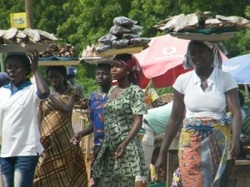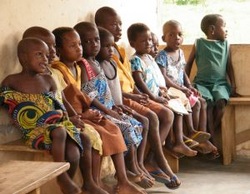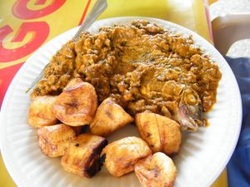People and CultureOne of the most striking features of Ghana is its diversity of people and culture. From ethnicity, to food, language, and religion, Ghana is home to a vibrant and rich variety.
Ethnic GroupsThe major ethnic groups in Ghana include the Akan, Ewe, Mole-Dagbane, Guan, and Ga-Adangbe. In the pre-colonial era, the distribution of these and other ethnic groups was part of the basis for state formation. Group solidarity was strengthened through competition for farmland, security, and trade routes. Rivalries that developed out of this contest along with the disproportionate impact of colonialism and postcolonial wealth distribution have all played a part of ethnic tensions in Ghana. While these tensions still exist to a degree today, Ghana can boast a relatively peaceful and democratic past.
Reflecting upon an ethnic clash in northern Ghana in 1994, the prolific writer on modern Ghana, Naomi Chazan, observed, “Undifferentiated recourse to ethnic categories has obscured the essential fluidity that lies at the core of shared ties in this country.” All administrative regions are heterogeneous, with many ethnic groups represented and respected. However, rural areas tend to reflect a more traditional ethnic distribution. Urban migration, shared concerns of professionals, and multi-ethnic constitution of schools contribute to inter-ethnic mixing and the resultant health of the country. In fact, ethnically based political parties are declared unconstitutional in Ghana today. LanguageEnglish is the national language of Ghana. There are over forty different local languages and nine of those languages are government-sponsored, including Akan, Dagaare, Dangbe, Dagbane, Ewe, Ga, Gonja, Kasem, Nzema. In the rural villages, there are countless other languages and dialects.
FoodSimilar to the diversity of Ghanaian ethnicity, language, food, and religion, Ghanaian food varies from region to region. It is ALL delicious!
Featured Recipe: KeleweleDescription: A delicacy prepared from ripe plantain well-seasoned with ginger, chili, cloves, then fried in hot oil to give it a peculiar mouth-watering flavor.
Ingredients: 4 firm plantains, 4 tsp lemon juice, 4 tsp ground ginger, 4 tsp cayenne pepper, oil for frying. Directions: Slice the plantains into ½ inch-thick slices. Sprinkle lemon juice over the pieces, stirring to moisten. In a separate bowl, combine the ginger and pepper. Heat about 1/4th inch of oil in a heavy skillet until a test piece of plantain sputters. Roll plantain slices a few at a time in the spice mixture to coat surfaces then transfer them to the skillet. Fry until outsides are crisp and golden. With a slotted spoon, remove plantains to an absorbent cloth or paper towel for slight cooling. Serve hot with whole or halved cashews. |
|
Home |
About R4G |
|




